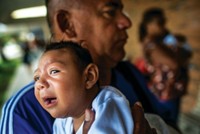Advertisement
Grab your lab coat. Let's get started
Welcome!
Welcome!
Create an account below to get 6 C&EN articles per month, receive newsletters and more - all free.
It seems this is your first time logging in online. Please enter the following information to continue.
As an ACS member you automatically get access to this site. All we need is few more details to create your reading experience.
Not you? Sign in with a different account.
Not you? Sign in with a different account.
ERROR 1
ERROR 1
ERROR 2
ERROR 2
ERROR 2
ERROR 2
ERROR 2
Password and Confirm password must match.
If you have an ACS member number, please enter it here so we can link this account to your membership. (optional)
ERROR 2
ACS values your privacy. By submitting your information, you are gaining access to C&EN and subscribing to our weekly newsletter. We use the information you provide to make your reading experience better, and we will never sell your data to third party members.
Biological Chemistry
Governments launch Zika study of pregnant women, infants
by Andrea Widener
June 27, 2016
| A version of this story appeared in
Volume 94, Issue 26
NIH and a Brazilian health research agency have launched an international study of almost 10,000 pregnant women in Zika-affected areas. Infection with the Zika virus causes small heads and other neurological birth defects in some children whose mothers contracted the disease while pregnant. But the full scope of how Zika causes these defects is not known. The agencies will recruit women in their first trimester of pregnancy and then follow them and their children for a year after birth. “This large prospective study promises to provide important new data that will help guide the medical and public health responses to the Zika virus epidemic,” says Anthony S. Fauci, director of the National Institute of Allergy & Infectious Diseases, one of the NIH centers supporting the research. The study will start in Puerto Rico and expand to Brazil, Colombia, and other areas where Zika has been transmitted to people by Aedes aegypti mosquitoes. The White House has asked for more funds to support Zika research and response.



Join the conversation
Contact the reporter
Submit a Letter to the Editor for publication
Engage with us on Twitter